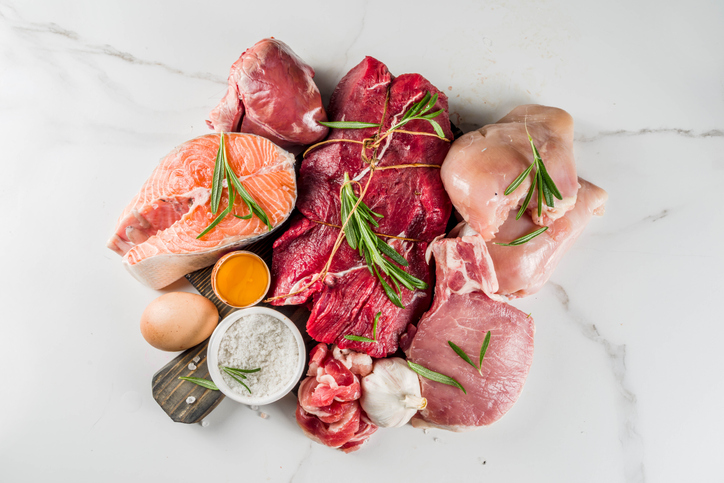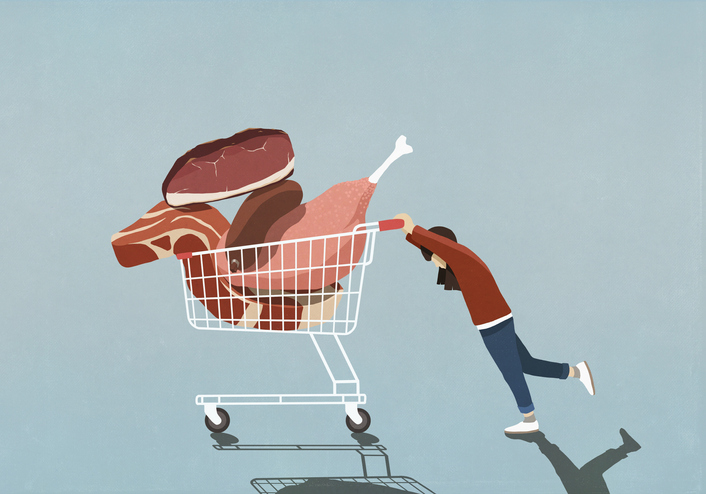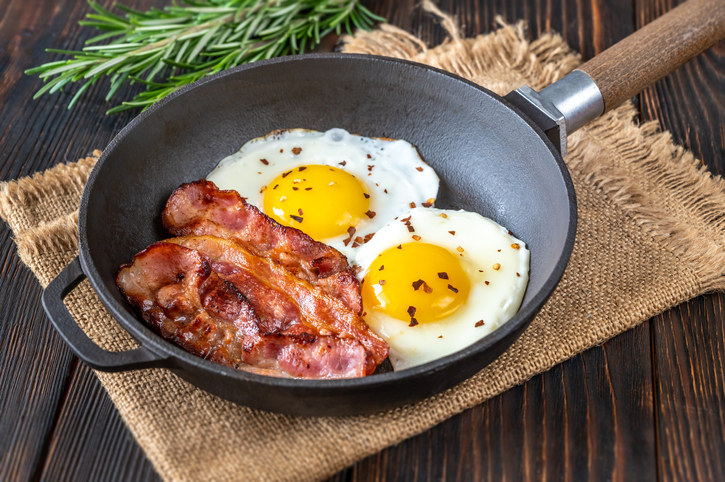It’s National Nutrition Month. Let’s Talk About the Popular Carnivore Diet

By Joy Stephenson-Laws, JD, Founder
I truly believe that being proactive about our health starts with what we put on our plates. March is National Nutrition Month, and it is perhaps a good time to reflect on how our daily diet choices impact our health.
It can be extremely confusing to select a diet best suited for our individual needs. When I use the word diet, I am not referring to a way of eating in which the goal is just to lose weight. For me, diet is a style of eating, that may change due to life events and changes such as pregnancy, menopause, aging, injury and nutritional deficiencies, that ideally promotes longevity and meets all nutritional needs as in getting a sufficient intake of the six basic nutrients we need to live:
Moreover, a diet that is best for me may not be a diet that is best for you, because, of course, we are not all the same. In addition to this, when a particular diet gets very popular on social media, it can be very tempting to jump on that specific diet bandwagon and see if it works for you. This is an issue we should all be very mindful of, because there may be misinformation on social media regarding health and nutrition.
One diet that has become very popular in the last couple of years or so is the carnivore diet, also called the lion diet.

I previously discussed the carnivore diet in a pH blog about a woman who went from being a vegan to being a carnivore. The carnivore diet only consists of animal foods such as eggs, butter, bacon, cheese, fish, poultry, pork and beef. This diet excludes most or all plant foods (fruits, vegetables, legumes, potatoes). It’s very restrictive, to say the least, and has zero to very little carbs depending on what exactly you eat. Remember, carbs is one of the six basic nutrients needed for survival mentioned earlier. Think of the carnivore diet as an extreme keto diet (another big trend).
It’s important to further discuss the carnivore diet this National Nutrition Month, because there are many advocates, including many meatfluencers all over social media, of this diet and what appear to be success stories of people who had health and weight issues and fixed them with the carnivore diet. I am personally not a fan of the carnivore diet which I will explain later, but I think it’s worth looking at some of the positive experiences with this diet. Perhaps we can extract some aspects of the carnivore diet which might be beneficial for health. I may not agree with a particular diet overall, but that does not mean there may not be characteristics of the diet that I would agree with.
What I like about the carnivore diet- It is high in protein. This nutrient is key in muscle building and repair. Protein may even provide protection against developing a fatty liver.
- It eliminates most processed, especially ultra-processed foods. Bacon, salami and cheese, which are allowed on the carnivore diet, are considered to be processed foods, but the carnivore diet eliminates so many ultra-processed foods such as baked goods, candy, potato chips and white pasta and white bread.
- It can help with weight loss. Protein is satiating which means a high-protein diet may prevent overeating and help with portion control. It’s also a lot easier to eat a big plate of french fries as opposed to a plate of chicken breasts or steaks.
- It can help identify food intolerances. Because this diet eliminates so much, you may realize your body responds well to no rice or legumes (for example).
Carnivore diet success stories.
I came across a recent story about a young man who reportedly lost 210 pounds by following the carnivore diet. Weighing more than 400 pounds, the 28-year-old was motivated to lose weight as he and his wife were having trouble conceiving their first child. He started to lose weight very quickly.
(Fertility & Food, What Men Need to Know)
“People think there’s some magic to it, but the reality is you’re just eliminating overeating—as it’s really hard to binge eat meat,” he said.
He did eventually introduce fruit back into his diet. In many cases, the carnivore diet is not a life-long commitment. It’s simply not sustainable to eat meat, cheese and eggs for the rest of your life.
Middle-age and Boomer women on the carnivore diet.
Another recent article profiled five women over the age of 50 who went on the carnivore diet. All of the women lost between 82 to 131 pounds. One woman was able to reverse her diabetes and get off her prescription medications. Another woman said the carnivore diet greatly helped with menopause symptoms. Protein is also especially important for Boomers, because with aging comes muscle loss.
(Study Shows Older Adults May Need a Protein Intervention)
Again, this was more of a temporary diet, as one woman said she eventually started adding small amounts of vegetables and nuts to her diet. Basically, because this diet is low-carb and avoids a lot of processed foods it seems that it’s very effective for losing weight.
But at what cost?
If you are vegetarian or vegan, I obviously do not have to convince you not to be a carnivore, but if you are a big meat eater the carnivore diet may appear very appetizing. It’s also not my role to convince pH readers to follow a certain diet, but I will discuss why I do not think the carnivore diet is overall a healthy one - especially long term.
The carnivore diet and scurvy.
Singer James Blunt said he developed scurvy (a severe vitamin C deficiency) after adopting the carnivore diet for just eight weeks. Vitamin C is a micronutrient found in plant foods such as oranges, kiwi, lemon, grapefruit, bell peppers, strawberries, tomatoes, broccoli, cabbage and cauliflower.
Vitamin C protects the immune system from deficiencies that may lead to cardiovascular illnesses and other diseases. It is one of the most important nutrients needed for our survival. It is also an antioxidant, which means it protects our bodies from free radicals and other harmful molecules. It is a major producer of collagen, which is the main ingredient behind the repair of bone and skin tissue, cartilage, ligaments, tendons and teeth. Vitamin C also helps moisturize and nourish the skin, which may increase skin elasticity and may even restore a youthful appearance.
A potential deficiency in Vitamin C may be a factor if you are considering the carnivore diet.
The carnivore diet and colorectal cancer.
This is a huge concern. The carnivore diet includes red meat and processed meats such as bacon, both of which have been linked to colorectal cancer. The carnivore diet also lacks a significant amount of dietary fiber, and fiber has been linked to a decreased risk of colorectal cancer.
(A Strong Case for Increasing Your Fiber Intake (Even if You’ve Been Diagnosed with Colorectal Cancer))
(A Low-Fiber Diet May Not Be So Gut Friendly, Even If You Are Not Obese)
The carnivore diet and heart disease.
It’s probably not surprising that a carnivore diet may increase your risk for developing cardiovascular disease. It’s a diet that is very high in saturated fat which has been linked to stroke and heart disease (the leading cause of death for both American men and women).
“Consuming high amounts of four major saturated fatty acids—found in red meat, dairy fat, butter, lard, and palm oil—may increase risk of coronary heart disease,” according to a study conducted by Harvard T.H. Chan School of Public Health.
Furthermore, a study published by the National Institutes of Health (NIH) discovered evidence suggesting that consuming red meat on a daily basis (which many people on the carnivore diet do) triples a heart disease-related chemical called Trimethylamine N-oxide (TMAO).
“It's not healthy at all," said Dana Ellis Hunnes, a UCLA dietician who was interviewed about the carnivore diet for an article with USA Today.
She also said that this diet is “detrimental to our microbiome, to our heart health, to our brains. I can't even say badly enough about it."
(Your Love of Bacon Could Cause You Your Sanity (Really!)

The carnivore diet also lacks thiamin (vitamin B1) and folate (vitamin B9). Thiamin plays a big role in energy metabolism. It is important for the growth, development and function of our cells. Folate does so much for our bodies, which you can read about in great detail here. Something to be aware of is beef liver is high in folate, but other meats, poultry and seafood are not that high in folate.
Overall, I just cannot get behind a diet that does not recommend eating plenty of fresh fruits and vegetables. These foods are known to have powerful anti-inflammatory properties and protect against all sorts of chronic illnesses. Depending on your health status and situation, it may not be a bad idea to adopt carnivore-ish habits. As always, speak with a competent healthcare professional. I would highly recommend checking your cholesterol levels and blood pressure. People with high cholesterol and high blood pressure should be cautious about the carnivore diet.
Whatever diet you tailor for yourself, it is always a good idea to undergo routine nutrient testing in order to identify any nutritional deficiencies or imbalances. If you are not nutritionally balanced, a competent healthcare practitioner can help you make the necessary dietary changes and recommend quality supplements if necessary.
Enjoy your healthy life!
Disclaimer: This article is not intended to provide medical advice. Please consult with your doctor or another competent healthcare practitioner to get specific medical advice for your situation.
The pH professional health care team includes recognized experts from a variety of health care and related disciplines, including physicians, attorneys, nutritionists, nurses, and certified fitness instructors. This team also includes the members of the pH Medical Advisory Board, which constantly monitors all pH programs, products, and services. To learn more about the pH Medical Advisory Board, click here.







